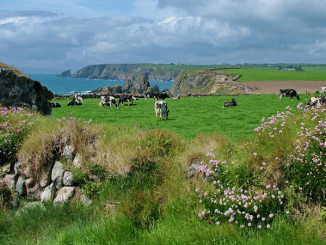
Ministers have given their final blessing to the EU’s Nature Restoration Law, marking the last milestone for the law to enter into force. But proponents shouldn’t put the champagne on ice just yet, as the law could face more legal twists in its tumultuous trajectory. Natasha Foote reports on the latest from Brussels.
The notorious Nature Restoration Law (NRL), proposed in June 2022, aims to reverse the drastic decline of Europe’s nature, with the ambition to restore 20% of the EU’s land and sea areas by 2030, and incrementally working towards full health by 2050. It includes a number of provisions that touch the agricultural sector, including the development of national plans on restoration measures and voluntary rewetting of peatlands.
After an extremely rocky road paved with push backs, the final shape of the law was green-lit and all that was left was for lawmakers to officially sign off the law. This final seal of approval is usually a formality – but proved anything but for this law after last minute politicking derailed proceedings in the Council back in March, throwing the future of the law into question.
But this all changed on Monday (17 June) after a last minute manoeuvre from Austria’s Environment Minister, Leonore Gewessler, who threw her weight behind the law despite opposition back at home (and this is key – more on this below).
This, combined with support from previously sceptical Portugal and Slovakia, was enough to push the law over the finish line, securing the necessary – but narrow – majority needed to seal a deal on the law.
Needing 15 member states representing 65% or more of the EU’s population, the NRL now has 20 member states and 66.07% – up from 64.05% at the previous council meeting.
But it was tight, given that Italy, the Netherlands, Sweden, Finland, Poland and Hungary all opposed the law, while Belgium abstained due to regional differences after failing to convince Flanders to back the law.

Not out of the woods just yet
The law might be on the home stretch, but it’s not home and dry just yet – because yes, you guessed it, there’s more drama waiting just around the corner.
That’s because, in backing the law, the Austrian minister stepped out of line. There was not a consensus back home from Austria’s 9 regions – and, as such, Gewessler had a clear mandate from the Austrian Chancellor to abstain from the vote.
“The Republic of Austria has already notified to abstain […] based on a uniform opinion of the Regional Governments, binding from the Federal Government under Austrian constitutional law, as well as the lacking consensus within the Austrian Federal Government,” a letter, sent from the Austrian Chancellor Karl Nehammer addressed to the Belgian Prime Minister Alexander de Croo and circulated online, reads.
The letter (snippet below), circulated online by Orban-backed think-tank MCC, makes it clear that Gewessler “may not give her consent to the [NRL] as she is not entitled to commit the Republic of Austrian according to Art 16 (2) TEU in this regard”.

As the minister ignored this direction, there are suggestions the Chancellor could seek to nullify the vote at the European Court of Justice (ECJ). Meanwhile, reporting from Euractiv suggests that the Austrian People’s Party is already seeking to file criminal charges against the minister for abuse of office.
It’s unclear at the moment exactly what this could mean for the outcome of the vote or on the timeline for the law to enter into force. It should be noted that Austria’s support was key for the law to pass – without it, the law would have been rejected.
But Gewessler has since bit back with a letter of her own, leaked online by Euronews, in which she and Vice Chancellor Werner Kogler maintain that a legally binding, uniform opinion from the Austrian Regional Governments is “not necessary” and that the Chancellor’s claims “lack legal basis”. “It is simply a political statement,” the letter reads.

Even if such a right of instruction existed, it would “only have legal effects within the internal organisation of the Member State, but would not affect the Minister’s right to represent Austria in the Council,” it adds.
Asked by ARC, the Belgians – who are the current holders of the rotating EU presidency, said that, as the Presidency, they “base [them]selves on votes in the Council”. “The minister represents her country and the vote she makes is legally binding,” a representative said, adding that the Council’s legal service “has also confirmed this”.
Questioned what would happen in the event that she was found to have acted beyond her powers, the representative reiterated that she was “registered as representing her country”. “We base ourselves on the views of the Council Legal Service,” they said, adding that everything that happens in Austria “is their internal kitchen in the end”.
A separate diplomatic source reinforced this, emphasising that they don’t see any issue at the EU level. “Whether that will lead to legal action in Austria… time will tell,” the source added.
Reactions so far

Despite the fallout, it seems there are no regrets from Gewessler herself. “My conscience tells me unequivocally: When the healthy and happy lives of future generations are at stake, courageous decisions are needed. That is why I voted for this [law] today,” Austria’s Gewessler wrote on X, calling the decision a “victory for nature”.
Meanwhile, Belgium’s Alain Maron, who is environment minister for the country’s Brussels-Capital region and chaired the meeting of EU environment ministers as his last under the Belgian Presidency, celebrated the decision, praising the Council for “choosing to restore nature in Europe,” adding that this will enable the EU to assume its responsibilities both at home and internationally.
The RestoreNature coalition, made up of BirdLife Europe, ClientEarth, EEB and WWF EU, called the outcome a “massive victory” for Europe’s nature and citizens, saying the day will “go down in history” as a turning point for nature and society.
The coalition pointed out the result followed a “massive public mobilisation”. Over the past few years, over a million signatures and messages from citizens, repeated calls from 6000+ scientists, 100+ businesses, youth organisations, and civil society from across numerous sectors have been made to defend the law and the integrity of the EU Green Deal.
However, the result is unlikely to please EU farmers’ association Copa-Cogeca, who have waged a sustained campaign against the law, citing concerns over compensation measures for landowners and whether to use the budget of the EU’s farming subsidies policy for restoration efforts.
ARC is following the fallout of this decision and the next steps closely, so stay tuned for more information as it comes to light.
More
Survey Shows Huge Support for Nature Restoration Law in Blocking Member States
Eleven Member States make last bid to save EU’s nature restoration law – but will it bear fruit?
EU’s Nature Restoration Law at Critical Juncture after Pushback by Member States
Nature Restoration Law Passes Final Hurdle in Parliament, Now Set to Become Law





